Dental Implants — Dallas, TX
A Seamless & Beautiful Smile Awaits!

When was the last time you felt confident smiling even though you were missing a tooth or struggling to keep a denture in your mouth? Instead, you could be taking advantage of an advanced solution like dental implants! This restorative treatment is meant to provide results unlike any other tooth replacement option. With them, you’ll be able to eat, speak, and smile with confidence once again! By seeing a team of prosthodontists and implant dentists for your future dental implant, you’re sure to gain a new smile that looks incredible and functions beautifully for decades! A seamless and beautiful smile awaits, so don’t hesitate to contact Dallas Esthetics today.
Why Choose Dallas Esthetics For Dental Implants?
- Implant Placement & Restorations Completed Under 1 Roof
- Replace Any Number of Missing Teeth for Life
- Flexible Financing Available To Make Dental Implants Affordable
What Are Dental Implants?

A dental implant is unique because it recreates the entire tooth structure from the root up. A traditional dental prosthetic only treats the portion of the tooth visible above the gum line. A dental implant goes a step further to also restore the root using a titanium implant post. Your jawbone will fuse to the post, providing a stable foundation for the restoration, which is attached using an abutment. This method allows you to enjoy a nearly perfect replica of your natural tooth.
The 4-Step Dental Implant Process
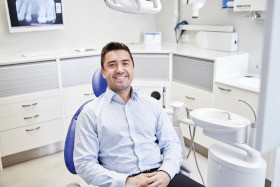
If you commit to getting dental implants, you should know that the process will take more than one visit to complete. We’re able to handle every step of this process in-office, and we’ll be right by your side to make sure everything goes smoothly on your journey toward a beautiful, reliable new smile. The details of the dental implant process can vary, but you can expect it to consist of the following four steps.
Initial Dental Implant Consultation
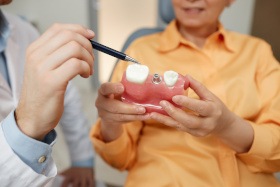
At the initial consultation, we will help you find the answer to a very important question: are dental implants right for you? Our team will complete a thorough examination of your mouth and facial structures, and they’ll use the gathered information to determine whether dental implants are viable in your case.
In certain situations, you may require bone grafting, gum disease treatment, or some other type of preliminary work in order to ensure that dental implants can be placed in your mouth without issue. We can move on to the next stage of the process once the necessary preparatory steps are complete.
Dental Implant Surgery

Unlike other tooth replacement methods, dental implants interface directly with the jaw, which means they have to be placed surgically. Fortunately, this procedure is relatively simple; once we’ve applied a local anesthetic to your mouth to keep you comfortable, we can open your gums and insert the implant posts into the bone at carefully chosen locations and angles.
The gums will be closed once the implant posts are in place. Special protective caps will be attached to the posts; this will help make sure that your gums maintain the right shape as they heal.
Dental Implant Osseointegration & Abutment
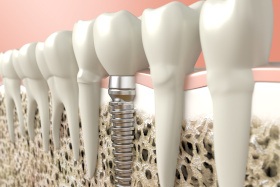
Osseointegration is a natural process that allows your dental implant posts to fuse with the bone in your jaw. This step is essential for ensuring the long-term success of your dental implants. You will need to take appropriate measures to keep your implant posts safe until osseointegration is complete, which generally takes about three to six months.
Before moving on to the last step of the implant process, we will need to attach abutments. An abutment is a small connector piece made of metal; it has the important job of keeping your final restoration anchored to the implant posts.
Delivery of Dental Implant Restoration(s)
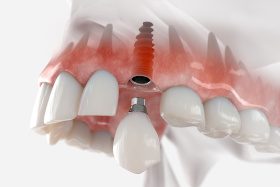
During the final step of the dental implant process, impressions will be taken of your smile. Then your final crown, bridge, or denture will be created by trained ceramists at a dental laboratory. When the prosthesis is complete, it will be sent to our office. We’ll then be able to schedule one last appointment to attach your replacement teeth to your implant posts. Your new smile will finally be complete, and you’ll be ready to show it off to the rest of the world with confidence!
Benefits of Dental Implants

It truly doesn’t matter how many teeth you are missing; dental implants have the ability to replace teeth whether you’re missing your first permanent tooth or have been wearing dentures for a while now. Once your implant has fully integrated with your existing jawbone, you can expect better oral and overall health for many years to come! The bone tissue will no longer continue to resorb back into the body if it’s being stimulated by a prosthetic root, which is exactly what implants are designed to do. With more than 3 million people experiencing a better way of life because of these permanent prosthetics, it’s time you do the same! If you need a bit more convincing, here are a few additional benefits of dental implants in Dallas:
Day-to-Day Benefits

Once your prosthetics are firmly in place, you will find that your day-to-day life will allow for improved eating and speaking, and you’ll even find yourself smiling much more. Want to know what else you can expect? Check these out:
Health Benefits

Your appearance isn’t the only thing that will benefit from dental implants. Your oral and overall health will, too! Here’s how:
Long-Term Benefits

As you spend more time with your dental implants, you will discover many long-term benefits come with these superior tooth replacement solutions, such as:
Who Dental Implants Can Help

Dental implants are ideal for those who may have been previously considering a traditional bridge or denture to replace their teeth. Take a moment to learn how our team creates your new smile powered by dental implants!
Who Is a Good Candidate for Dental Implants?

If you have lost a single tooth, multiple teeth, or an entire arch, you might be a candidate for dental implants if you have good oral and general health. Your Dallas implant dentist will perform a thorough consultation to examine your dental health. They will also review a CT scan of your jaw to look for any hidden issues, like bone loss or infection.
We will also take the time to discuss your medical and lifestyle history to ensure there aren’t any concerns, like smoking. Based on the results of the consultation, we’ll create a customized treatment plan. You may need additional procedures to become a candidate for dental implants, such as bone grafting or periodontal therapy.
Missing 1 Tooth

With the help of a single titanium implant and porcelain crown, we can fill the gap in your smile. Our office uses porcelain because of it’s incredibly similar qualities to natural tooth enamel.
Missing Multiple Teeth

The best way to replace multiple consecutive teeth is via a dental bridge retained with implants. Instead of removing enamel from neighboring teeth to anchor the bridge, an implant is placed on either side of the gap. In most cases, two implants are sufficient to hold a restoration consisting of two or more crowns.
Missing All Teeth

Need to replace a full arch of teeth? Dentures can be custom-made to snap onto four to six strategically placed implants throughout the mouth. The denture can also be made to be either fixed or removable, depending on your preferences.
Understanding the Cost of Dental Implants

Dental implants are a comprehensive solution for missing teeth, but understanding the cost beforehand is crucial. After your initial consultation, we can provide you with an estimate to help you plan accordingly. It's important to consider that while dental implants may initially seem pricier, they often last for decades, whereas traditional bridges and dentures may need replacement within about 10 years. Keep reading to learn more about the expected cost of dental implants in Dallas!
Preliminary Treatments & Dental Implant Surgery

Our team will evaluate your oral health to determine if any preliminary treatments are necessary to ensure the success of your restorations. Many patients may require procedures such as gum disease treatment, bone grafting, or tooth extractions before starting implant treatment to rebuild their smile effectively. While these additional treatments may increase the overall cost, they are vital for restoring your smile.
The cost of your dental implants will also be influenced by the surgical placement. Factors such as the location of the metal posts in your mouth and the type of sedation used during the procedure will affect the final price. The advantage of our practice is that we handle the entire implant process in-office, eliminating the need for you to visit an outside specialist and simplifying the process for you.
The Parts of Your Dental Implant

Not all dental implant cases are created equal. The best way to determine your total cost is to visit our office for a consultation. During this appointment, you’ll be able to ask any questions you may have as well as consider the factors most likely to influence cost. These include:
- The number of implants being placed
- The materials used in the implants
- The need for preparatory treatments, such as sinus lifts, periodontal therapy and bone grafts
- The location of the implants
- The complexity of the restoration needed
How Dental Implants Pay for Themselves

While dental implants may have a higher initial cost, their long-term affordability is impressive. Unlike bridges and dentures, implants are securely anchored in your jawbone. This provides a stable and natural foundation for your new teeth, while also preserving the health of your remaining natural teeth and promoting gum comfort. Additionally, implants typically require fewer repairs or adjustments over time compared to traditional restorations, leading to potential savings in the long run.
Does My Dental Insurance Cover Dental Implants?

Insurance coverage for dental implant procedures varies significantly between plans. Most insurance policies do not fully cover the entire implant process but may contribute towards certain aspects, such as restorations or preliminary treatments. Be sure to review the specifics of your policy with your provider before proceeding with any dental work.
Our experienced team is available to assist you in understanding your insurance benefits and maximizing coverage to reduce your out-of-pocket costs. Feel free to reach out to us for guidance and support in navigating your insurance plan.
Making Dental Implants Affordable

Our practice recognizes the significance of a complete smile and offers solutions to make dental implants accessible. With CareCredit financing, you can conveniently split the cost of your dental treatment into manageable monthly installments. Most of these plans feature minimal to no interest so you can comfortably stay within your budget while effectively rejuvenating your smile!
Dental Implant Post- Op Instructions

As with any surgery, you can expect there to be some discomfort after your procedure. You can manage any pain using an over-the-counter medication. If you have any swelling, apply a cold compress to the outside of your face for 10-minute intervals.
After the first few days following your surgery, any pain will gradually improve. While your discomfort, swelling, or bruising will dissipate within a couple of weeks, it will take a couple of more months for your jawbone to fully heal.
Maintaining & Caring for Your Dental Implants

Once dental implants join with your jawbone, they have the potential to last for the rest of your life. But that will only happen if you’re giving them the care they need to stay healthy and intact! By taking some simple precautions and maintaining healthy habits, you can keep your dental implants safe from damage, infection, and other possible causes of failure. Below are some tips for keeping your rebuilt smile safe for the long term.
Make Oral Hygiene a Priority

Dental implants cannot get cavities the way natural teeth do. Despite this, though, you still need to brush and floss them regularly so that the tissues supporting them don’t develop gum disease. When brushing, pay close attention to the area underneath your implant restoration. Use dental floss to clean the spots that you can’t reach with a toothbrush, and rinse with an antibacterial mouthwash to be as thorough as possible with your oral hygiene.
Eat a Healthy Diet

One of the benefits of dental implants is that you get to eat whatever you want. But while it’s okay to give yourself a treat every once in a while, you shouldn’t eat too many hard, sticky, or sugary foods that could potentially cause problems with your implants. Try swapping such foods out of your diet with more smile-friendly alternatives. Make sure you’re getting plenty of calcium and vitamin C to keep the bone and gum tissues supporting your implants healthy and strong.
Break Bad Habits

Do you often find yourself chewing on your fingernails or the end of your pen? Do you sometimes crunch the ice that comes with your drink? Do you tear open packages with your teeth when you can’t find any scissors? All of these bad habits can damage your implants and eventually cause them to break or fail. Take whatever steps you need to in order to stop habits that could be harming your new teeth. One useful trick is to keep sugarless gum on hand so that you have something safe to chew when you feel the urge.
Protect Your Dental Implants
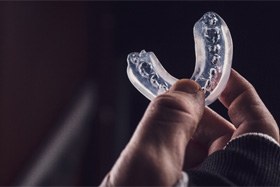
The titanium used to make dental implants is very strong and durable, but it can still be damaged in a sports-related accident. Play it safe by always wearing a mouthguard while you’re engaged in any sort of sport or physical activity. You can also get a nightguard to keep your dental implant safe from any grinding or clenching that might occur while you’re asleep.
Schedule Regular Dental Checkups

Dental implants give you one more reason to visit our office every six months for a cleaning and checkup. While we’re checking your other teeth for cavities, we can also examine your dental implants to see if there are any issues. Identifying small problems and treating them immediately often helps us avoid the larger issues altogether.
Dental Implant FAQs

Are Dental Implants Safe?
Dental implants are very successful when placed by a qualified professional. However, it’s important that the patient makes a good candidate for the procedure and is in good health. If you have low jawbone density or gum disease, these issues will need to be addressed beforehand to make the procedure safer. If you have other health issues, like diabetes or cancer, we can discuss your individual situation during your initial consultation with us. Your overall well-being is always our top priority.
How Successful Are Dental Implants?
When placed by a skilled professional, dental implants have a success rate of over 95%! However, it is crucial that you care for your implants properly with dental hygiene, routine checkups, and a healthy diet. The success of dental implants can also vary depending on where in the mouth they are located. This is because molars receive more strain from chewing than the front teeth do, so their success rate is slightly lower.
How Long Does It Take to Recover from Dental Implant Surgery?
Most patients are able to resume their normal activities the day after their surgery. However, it is a good idea to avoid strenuous activities for the first week or so, as it could delay the healing process. Bleeding should subside after the first couple of days, and swelling should stop after three to four days. Be sure to take your prescribed and over-the-counter pain relievers as directed. It can take up to six months for the implants to completely fuse with the jawbone.
Can I Get Dental Implants If I’m Diabetic?
If your diabetes is under control, your odds of dental implant success are generally comparable to those of nondiabetic patients. However, uncontrolled diabetes can slow down the healing process, making it more difficult for your implants to integrate with your jawbone. If you are interested in getting dental implants, but you’re diabetic, talk to your doctor about getting your blood sugar levels under control ahead of time.
Do Dental Implants Make You Look Younger?
When a tooth is missing in the mouth, the jawbone loses stimulation in that area. This leads to bone loss which results in a more wrinkled, sunken-in face and fine lines around the mouth. Dental implants are the only type of tooth replacement option that can stimulate the jawbone through regular chewing, so it prevents the bone atrophy that makes you appear older.
